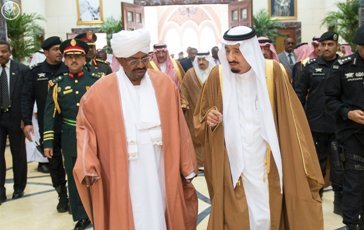Sudan handed over Saudi extremists to Riyadh: Bashir
March 14, 2016 (KHARTOUM) – Sudanese President Omer al-Bashir has disclosed that his government handed over unidentified number of Saudi extremists to Riyadh.

“Security of the Kingdom [of Saudi Arabia] takes precedence over the security of Sudan because it is the security of the Two Holy Mosques,” he said.
The Sudanese president said he expressed readiness to help Riyadh to defend its borders against the Houthi’s attacks since the era of the late King Abdallah bin Abdel-Aziz, pointing he conatcted the Saudi monarch in this regard.
“I expressed our readiness because the security of the Kingdom [of Saudi Arabia] is considered a red line for us,” he said.
Bashir added that Sudan didn’t hesitate to participate in the Saudi-led “Decisive Storm” operation, saying the deteriorating conditions in Yemen posed a serious danger to the whole region not only Saudi Arbia.
“Because if the Huthi’s managed to control Yemen, it wouldn’t definitely be their final destination,” he said.
He revealed that Sudan provided the ousted Yemeni President Ali Abdalla Salih with ammunition during his war against the Houthi’s, saying Salih unexpectedly became an ally for the Huthi’s.
Sudan participates with over 850 troops in the Saudi-led “Decisive Storm” against the Iranian-allied Houthi militants in Yemen.
Sudanese troops are also participated in the “North Thunder” military manoeuvres in Saudi Arabia among 20 other Arab and Islamic nations.
The Sudanese military participation in the military campaign in Yemen and the Islamic alliance reconciled Bashir’s regime with the Saudi government, and marked the divorce with Iran.
Meanwhile, Bashir said that the Syrian President Bashar al-Assad represents the minority Alawite sect and he wouldn’t abandon power except by force.
“He would fight to death particularly as he receives support from Russia, Iran and Hezbollah,” he added.
The Sudanese president pointed that Iran has a regional expansionist project, saying his government cut ties with Tehran once they discovered its plans to spread the Shii’te ideology in Sudan.
He added that Saudi Arabia wasn’t content with Iran’s presence in Sudan because it poses a great danger to the region.
“We later realized that the [Saudi stance] toward Iran’s intentions and bad behaviour was right [and that is why] we expelled them from our country,” he said.
Bashir expressed hope that Sudan could join the Gulf Cooperation Council (GCC), saying “we thought about that and our relationship with all leaders and peoples of the Gulf States without exception are excellent”.
He denied that the death of the Islamist leader Hassan al-Turabi would create a vacuum or negatively impact on the government, saying his passing could weaken the Sudanese opposition.
“His [Turabi’s] party gave the opposition additional weight and created a balance in the political process,” he said.
Responding to a question about South Sudan, the Sudanese president described the newborn country as “failed state”.
(ST)
